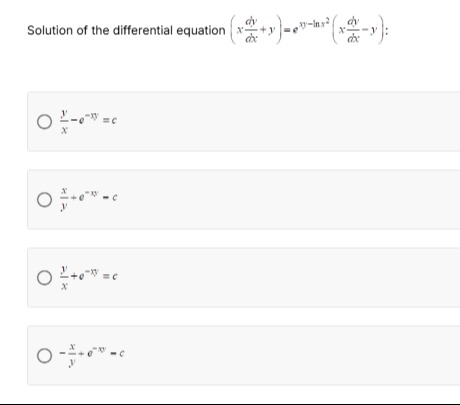Question
Question: Solution of the differential equation $\left(x\frac{dy}{dx}+y\right)=e^{xy-lnx^2}\left(x\frac{dy}{dx...
Solution of the differential equation (xdxdy+y)=exy−lnx2(xdxdy−y):

xy−e−xy=c
yx+e−xy=c
xy+e−xy=c
−yx+e−xy=c
xy+e−xy=c
Solution
The given differential equation is: (xdxdy+y)=exy−lnx2(xdxdy−y) First, simplify the exponential term: exy−lnx2=exy⋅e−lnx2=exy⋅eln(x−2)=exy⋅x−2=x2exy Substitute this back into the differential equation: xdxdy+y=x2exy(xdxdy−y) We can recognize that the left side is the derivative of the product xy: dxd(xy)=xdxdy+y And the term xdxdy−y is related to the derivative of the quotient xy: dxd(xy)=x2xdxdy−y⟹xdxdy−y=x2dxd(xy) Substitute these into the differential equation: dxd(xy)=x2exy(x2dxd(xy)) dxd(xy)=exydxd(xy) Let u=xy and v=xy. The equation becomes: dxdu=eudxdv This is a separable differential equation. Rearrange and integrate: eu1du=dv e−udu=dv ∫e−udu=∫dv −e−u=v+C Substitute back u=xy and v=xy: −e−xy=xy+C Rearranging the terms: xy+e−xy=−C Let c=−C be a new arbitrary constant. xy+e−xy=c
